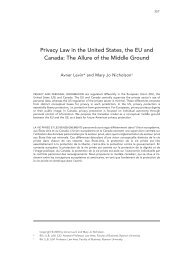Commentary on Fichte's “The Illegality of the Unauthorised ... - uoltj
Commentary on Fichte's “The Illegality of the Unauthorised ... - uoltj
Commentary on Fichte's “The Illegality of the Unauthorised ... - uoltj
You also want an ePaper? Increase the reach of your titles
YUMPU automatically turns print PDFs into web optimized ePapers that Google loves.
180 university <strong>of</strong> ottawa law & technology journal www.<strong>uoltj</strong>.ca<br />
vor, die durch ihr eignes Nachdenken,<br />
und die Aufnahme derselben in ihre<br />
Ideenreihe, die ihrigen geworden sind;<br />
im erstern, bemächtigen sie sich seiner<br />
Form, die nie ihr Eigenthum werden kann,<br />
kränken ihn also in seinem vollkommnen<br />
Rechte.<br />
14. Und jetzt diese a priori erwiesenen,<br />
und a posteriori durch die aus ihnen<br />
mögliche Erklärbarkeit dessen, was<br />
in Sachen der Art für Recht gehalten<br />
wird, erprobten Grundsätze, auf das<br />
Verhältniß des Verfassers und des<br />
Verlegers angewandt! Was überträgt<br />
der Erstere an den Letztern, indem er<br />
ihm seine Handschrift übergiebt? ... Ein<br />
Eigenthum? Etwa das der Handschrift?<br />
Aber die Gelehrten werden gestehen,<br />
daß diese größten<strong>the</strong>ils des Geldes nicht<br />
werth sei; und warum verzeihen sie es<br />
sich denn nicht, mehrere v<strong>on</strong> eben der<br />
Schrift an mehrere Verleger zu verkaufen?<br />
Das Eigenthum der darin enthaltenen<br />
Gedanken: Dies überträgt sich nicht durch<br />
eine bloße Uebergabe; und selten würde<br />
dem Verleger viel damit gedient sein.<br />
— Noch weniger das der Form dieser<br />
Gedanken: denn diese ist, und bleibt auf<br />
immer, ausschließendes Eigenthum des<br />
Verfassers. — Der Verleger bekommt also<br />
durch den K<strong>on</strong>trakt mit dem Verfasser<br />
überhaupt kein Eigenthum, s<strong>on</strong>dern unter<br />
gewissen Bedingungen nur das Recht eines<br />
gewissen Niessbrauchs des Eigenthums<br />
des Verfassers, d. i. seiner Gedanken in<br />
ihre bestimmte Form eingekleidet. Er darf<br />
an wen er will und kann, verkaufen — nicht<br />
die Gedanken des Verfassers, und ihre<br />
Form, s<strong>on</strong>dern nur die durch den Druck<br />
derselben hervorgebrachte Möglichkeit<br />
sich die erstern zuzueignen. Er handelt<br />
also allenthalben nicht in seinem Namen,<br />
s<strong>on</strong>dern im Namen und auf Auftrag des<br />
Verfassers.<br />
<strong>the</strong> process <strong>of</strong> <strong>the</strong>ir own thinking, and<br />
<strong>the</strong> taking up <strong>of</strong> <strong>the</strong>se ideas in <strong>the</strong>ir own<br />
thought processes, become <strong>the</strong>ir own<br />
ideas. In <strong>the</strong> first case, <strong>the</strong> form <strong>of</strong> <strong>the</strong><br />
lecturer's ideas, which cannot become<br />
<strong>the</strong> property <strong>of</strong> o<strong>the</strong>rs, is appropriated,<br />
which infringes <strong>the</strong> lecturer's exclusive<br />
rights.<br />
14. And now let us apply <strong>the</strong> principles,<br />
which we have proven a priori and tested<br />
a posteriori by dem<strong>on</strong>strating that <strong>the</strong>y<br />
explain what is c<strong>on</strong>sidered right in <strong>the</strong>se<br />
matters, to <strong>the</strong> relati<strong>on</strong>ship between<br />
<strong>the</strong> author and <strong>the</strong> publisher. What<br />
does <strong>the</strong> former give over to <strong>the</strong> latter<br />
when he hands over his manuscript?<br />
Property? Perhaps his property in <strong>the</strong><br />
manuscript? But scholars will admit<br />
that <strong>the</strong> manuscript is for <strong>the</strong> most part<br />
not worth any m<strong>on</strong>ey. And why, <strong>the</strong>n,<br />
do <strong>the</strong>y not forgive <strong>the</strong>mselves if <strong>the</strong>y<br />
sell copies <strong>of</strong> <strong>the</strong> same manuscript to<br />
several publishers? The property in <strong>the</strong><br />
manuscript cannot be transferred merely<br />
by turning over <strong>the</strong> manuscript [to<br />
ano<strong>the</strong>r], and it is seldom that <strong>the</strong> latter<br />
would be very useful to <strong>the</strong> publisher.<br />
Still less is it <strong>the</strong> property in <strong>the</strong> form <strong>of</strong><br />
<strong>the</strong>se ideas, since this remains forever<br />
<strong>the</strong> exclusive property <strong>of</strong> <strong>the</strong> author.<br />
The publisher thus does not receive<br />
any property at all through <strong>the</strong> c<strong>on</strong>tract<br />
with <strong>the</strong> author, but ra<strong>the</strong>r [231] receives<br />
<strong>on</strong>ly <strong>the</strong> right, under certain c<strong>on</strong>diti<strong>on</strong>s,<br />
to <strong>the</strong> usufruct <strong>of</strong> <strong>the</strong> property <strong>of</strong> <strong>the</strong><br />
author, i.e., to his thoughts clo<strong>the</strong>d in a<br />
particular form. The publisher may sell<br />
to whomever he can or wishes to sell<br />
to, not <strong>the</strong> thoughts <strong>of</strong> <strong>the</strong> author and<br />
<strong>the</strong>ir form, but <strong>on</strong>ly <strong>the</strong> possibility <strong>of</strong><br />
appropriating <strong>the</strong> thoughts that arises<br />
through <strong>the</strong>ir printing. The publisher<br />
thus in every case is acting, not in his<br />
own name, but in <strong>the</strong> name <strong>of</strong> and <strong>on</strong><br />
behalf <strong>of</strong> <strong>the</strong> author.









